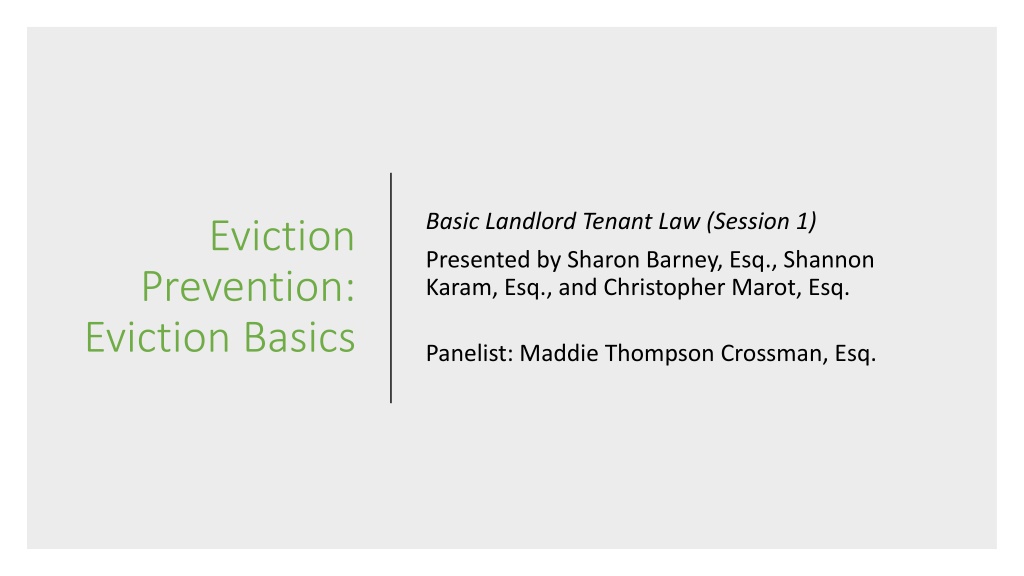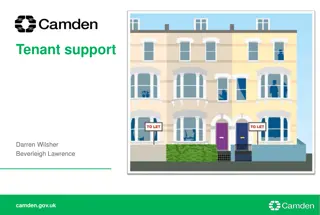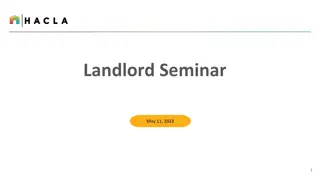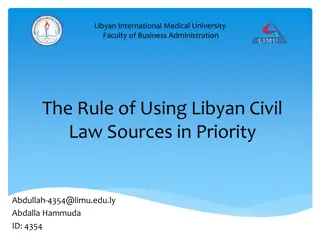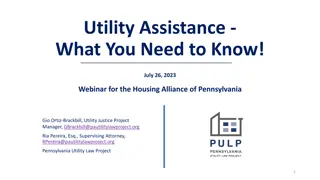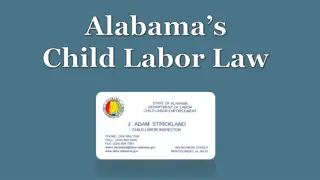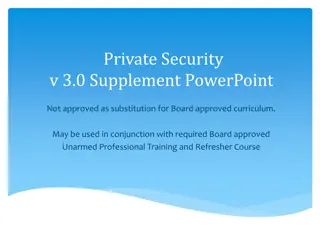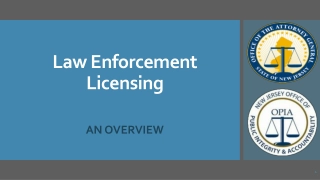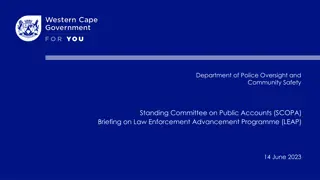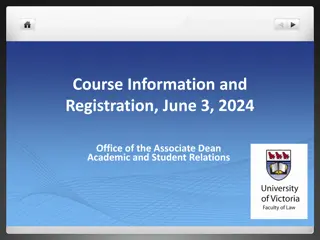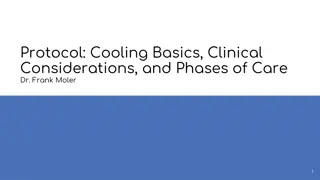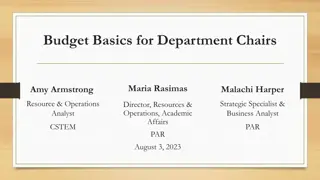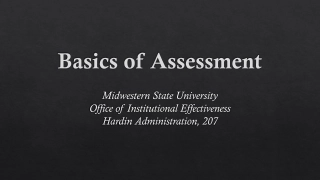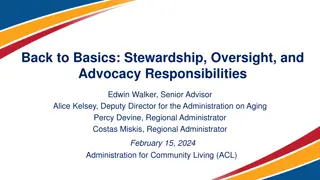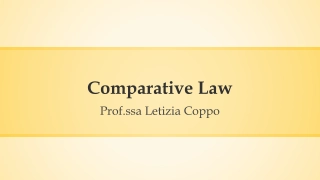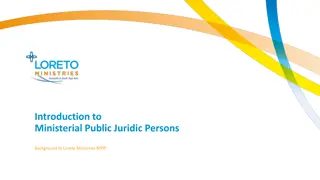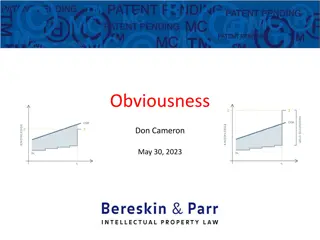Understanding Landlord-Tenant Law: Eviction Basics
Learn about different types of tenancies, the eviction process, common scenarios, and defenses to eviction. Discover the consequences of eviction, including legal procedures and potential outcomes for both landlords and tenants. Gain insights into termination of tenancy and the important steps involved. With increasing eviction rates, understanding your rights and obligations is crucial.
Download Presentation
Please find below an Image/Link to download the presentation.
The content on the website is provided AS IS for your information and personal use only. It may not be sold, licensed, or shared on other websites without obtaining consent from the author. Download presentation by click this link. If you encounter any issues during the download, it is possible that the publisher has removed the file from their server.
Presentation Transcript
Basic Landlord Tenant Law (Session 1) Presented by Sharon Barney, Esq., Shannon Karam, Esq., and Christopher Marot, Esq. Eviction Prevention: Eviction Basics Panelist: Maddie Thompson Crossman, Esq.
Civil legal services provider with 6 offices statewide, from Presque Isle to Portland One of several legal services providers in Maine Wide range of practice areas: housing, family, benefits, consumer, tax, education, and more About 36% of PTLA intakes in 2022 were for evictions, or a total of 2,335 eviction cases According to Maine Judicial Branch data, eviction case filings in early 2023 are at a 15 year high Pine Tree Legal Assistance
Identify different types of tenancies and the rules that apply to each. Understand the steps in the eviction process. Be able to analyze common eviction scenarios and identify defenses to eviction. Learning Objectives
Landlord is able to force a tenant out, aided by law enforcement if necessary The tenant has a long-term court record Evictions can be posted on your credit report Eviction from federally subsidized housing could result in loss of subsidy or hurt your chances of getting a future subsidy Could lose belongings if left behind and not claimed under the Abandoned Property Statute The tenant may become homeless What Eviction Means
1. Notice to Quit 2. Summons and Complaint (Forcible Entry and Detainer) with court date 3. Court date 4. Writ of Possession Eviction Process 5. Trespasser
Termination must happen before eviction action begins. This takes the form of a Notice to Quit, Notice of Termination, or Notice of Intent to Terminate. The Notice must state the grounds of the termination, what the tenant can do to cure (if anything), and the ability to contest the termination at court along with an expiration for the Notice. Termination of Tenancy Generally
The property owner if an individual or LLC (but see representation restrictions) A property management company that has expressly been granted the authority to evict by the property owner (can ask for evidence/proof that this grant has been made) NB an LLC can only appear pro se if it is closely held. If not, then the LLC must appear with a lawyer. Failure to do so can be raised as a technical defense that results in dismissal of the FED action. 4 M.R.S.A. 807 Who can bring an eviction?
Termination of Tenancy: Common Issues that Lead to Eviction Non-payment of rent Habitual late-payment Behavior-related lease violations (noise, apartment conditions, mental health challenges)
Two main buckets of rentals Leasehold Tenancy at Will Rules of Rental Housing Lease provides a record of the rules and obligations of the landlord and tenant Protects tenant from changes in rent or rental conditions during the term Can include terms that are difficult for tenants to comply with Can be draconian with respect to fees and rules Month-to-month Governed by 14 MRS 6002 Specific, technical rules for terminating a rental agreement Least protective form of rental, except for notice requirements in event of eviction
If there is a subsidy (Sec 8, Project-Based Voucher, Public Housing, BRAP, Shelter+Care, etc) then there are extra rules the landlord must follow and greater protections for the tenant. We will go into these details at our next two trainings in May 31 at 2:00 pm and June 23 at 10:00 am. Key Issue to Spot: Fed Subsidies
14 MRS 6001 governs terminations based on leasehold. The terms of the lease control how the lease can be terminated. If a landlord doesn t comply with the lease, that is grounds for contesting the termination. This includes termination related to an expiring lease. If the lease says 60 days notice the lease will not be renewed then look to ensure a 60 day notice was provided. BUT if a lease ends without termination language, then the landlord can commence within 7 days of its expiration by filing a summons and complaint (without a notice to quit) Termination under a lease
Well next discuss common grounds for evictions in leaseholds and tenancies at will. We will cover issues to spot but you do not need to feverishly take notes in your materials is a Defenses Checklist that can help jog your memory of these items as you work through your cases. FED Defenses
Who are the parties to the lease? Is it the owner of the property? If it is the property manager, do they have authority to evict? Does the lease include termination language? If so, it controls. IF NOT, then apply 14 MRS 6002. How are notices to be served under the lease? Did the notice comply with the requirements (timing, delivery, grounds)? What to look for in a lease
A Month to Month tenancy can be terminated per 14 MRS 6002: For cause with a 7-day notice (non-payment, substantial damage, nuisance) No cause with a 30-day notice In Portland, the City ordinance requires a 90 day notice. A landlord can reduce this time by paying a month or two months worth of rent to a client to reduce this by 30 and 60 days respectively. Termination of a Tenancy at Will
MUST include this language: If you pay the amount of rent due as of the date of this notice before this notice expires, then this notice as it applies to rent arrearage is void. After this notice expires, if you pay all rent arrears, all rent due as of the date of payment and any filing fees and service of process fees actually paid by the landlord before the writ of possession issues at the completion of the eviction process, then your tenancy will be reinstated. Rent due is a number NOT December rent and not inclusive of fees. TAW Non- payment
It is important to calculate what the rent is, what the total should be, and to analyze whether inappropriate charges are included. TAW Non- payment Though the statute allows the landlord leeway for clerical errors that do not substantially impact the notice, we should be ready to challenge the impact the errors make and whether or not the error was intentional or inadvertent.
General Assistance (on-going, one-time, emergency assistance) TANF and DHHS Emergency Assistance Churches/Non-profits Payment plans Mitigating Non-Payment
Damage to unit Noise/Nuisance Mental Health-related disturbances Behavioral Violations
Mitigating Behavioral Violations Probation agreements Reasonable Accommodations VAWA Defense 14 MRS 6002(6)
Federal and State law prohibit landlords who receive public funds from evicting a tenant on a disability-related basis without first engaging in an interactive process to develop a reasonable accommodation of the tenant s disability. EX: Julie has a diagnosis of bi-polar disorder that manifests in manic flights of behavior where she plays loud music in her unit, impulsively shouts at other tenants, and tells the landlord to deal with real problems when confronted about the behaviors. Julie could request an accommodation that would permit her to continue her tenancy provided she was engaging in therapy and med management and following provider recommendations. We will cover this in greater detail in our subsidized housing trainings. Private landlords have some burden with respect to RAs, but it is lower than subsidized units. Reasonable Accommodation
Applies to domestic violence, stalking, and sexual assault. Victim cannot be evicted based on incidence(s) of actual or threatened domestic violence, stalking, and/or sexual assault that occurred at the premises or for damages related thereto that can be construed as: Nuisance under 6002 Damage to property under 6002 A lease violation arising from a nuisance, disturbance, or damage to premises. Documentation must be provided to the landlord if asserting these protections as set forth in statute. Does not prevent eviction for other reasons such as non-payment. BUT- a victim can terminate the lease early due to an incident or threat of domestic violence, sexual assault or stalking with appropriate notice (7 days for lease of less than 1 year, or 30 days for 1 year or more) and not be liable for any unpaid rent under the lease. Domestic Violence 14 MRS 6001(6)(A)-(B)
Tenants at will (and some leases) are subject to no-cause evictions where the landlord does not have to plead any specific conduct by the tenant in order to obtain possession/evict the tenant. 14 MRS 6002 requires that no-cause evictions be commenced with a 30-day notice to quit, served in hand or with three attempts, then posted AND mailed. No Cause Eviction
There are limited defenses to no-cause evictions. Analyze the technical aspects for the best chance at defeating a no-cause notice: When was the notice served? Was the tenant given 30 actual days from service? How was the notice served? In hand? Post and mail? Did the landlord accept rent after the notice expired? 14 MRS 6002 requires that no-cause evictions be commenced with a 30-day notice to quit, served in hand or with three attempts, then posted AND mailed. Defending Against a No Cause Eviction
We have had strong success arguing that acceptance of rent after a no-cause notice expires WAIVES the notice and establishes a new tenancy. If this situation arises in your case, reach out to us for help briefing the issue. Best practice will be to establish that rent was tendered and accepted after the notice expired and to ask the court to permit written closing briefs. NB this argument is more challenging if the notice to quit says that any money accepted post-notice isn t for rent, but for use and occupancy. Defending Against a No Cause Eviction - Waiver
Ways to Settle You can . Agree to a payment plan or other conditions to stay OR Agree on a move out date And then . Continue the case to have more time to make it happen Let a judgment enter that gives you time to make it happen OR
Barriers: Fear of landlord, lack of knowledge, past experience with requests going unacknowledged Tools: Demand letters, Code Enforcement, Agency intervention Asserting Tenants Rights
14 MRS 6021 requires landlords to provide safe and healthy housing to tenants. This applies to major issues: Heat No water/bad water Leaks/mold (but be careful) Lead paint Structural dangers (exits, porches, stairs, etc) Warranty of Habitability
Tenants should make sure any notice to the landlord about issues is in writing. This provides concrete evidence of the landlord s knowledge, date of disclosure, and proof of retaliation if needed. If a text/letter doesn t work, tenant may consider a formal demand letter requesting resolution in 30 days (there are templates on ptla.org). Tenant can call Code and have a Code Officer inspect the unit. Tenant can notify subsidy provider who can abate (withhold rent) from landlord. **The tenant should continue to pay rent.** Starting a Warranty of Habitability Complaint
Be proactive - dont wait for eviction to raise the issue Keep records Complaints to landlord Complaints to Code Pictures of issues Receipts if tenant has to spend money/resources as a result (extra heaters, covering for broken windows, new stove, etc) Best practices in dealing with Warranty of Habitability **Keep these records safe in case landlord sues post- tenancy or retains security deposit**
Non-payment: Can raise serious warranty issues (lack of water, no heat, inability to access an entire room) to reduce the amount of rent owed. Must be able to prove that the landlord was told in writing or had actual knowledge of the issue. The judge will decide whether the issue rises to the level of a reduction in rent and will be permitted to determine the amount of the reduction. In general, the tenant will be given a window of time to pay the adjusted balance (if any). If the tenant does not pay, then the judgment would enter automatically. Warranty Issues as a defense to eviction Retaliation: This is a very narrow defense to no-cause evictions. If the tenant files a human rights complaint, complains to Code, or another government agency tasked with enforcing landlord-tenant laws, and is then served with an eviction notice, the tenant can raise a presumption of retaliation. The landlord then has the burden to prove the eviction is NOT for retaliatory purposes (tenant also owes back rent, criminal activity, landlord has firm plans to renovate or sell, etc.). Tread carefully with this defense as it is full of potential pitfalls.
Hypotheticals Welcome to our panelists! Sharon Barney PTLA Pro Bono Staff Attorney Maddie Thomson Crossman PTLA Augusta Staff Attorney Shannon Karam PTLA Pro Bono Director Chris Marot PTLA Eviction Prevention Coordinator
Scenario 1 Our client is a single person with no lease. The client received a 30-day Notice to Quit with no reason stated for the termination of the tenancy. The Notice just says you have to leave in 30-days. The Notice was served on 4/1. The Summons and Complaint were served on 4/30 by posting them on our client's door. The rent is current and the LL accepted May rent. What kind of tenancy is this? Notice what do we need to know? What about the Summons and Complaint? How do we counter the argument that if the Defendant appears at court, why does the sufficiency of service of process matter? 14 MRS 6004 as an exception to M.R.Civ.P. 4 Acceptance of rent does it matter? Of the defenses, which do you want to focus on the most and why?
Scenario 2 Our clients are domestic partners. They do not have a lease. They have received a 7-day notice for cause. The allegation is consistently parking in the wrong place in the driveway. What are our defenses? (would parking constitute a nuisance?) Besides non-payment, what are the limits of the 7-day termination of a tenancy at will? What if the landlord brings up new problems at trial that are not contained in the notice? Can the landlord go forward with the new allegations? Assume that this landlord lost at a hearing on the 7-day notice. How would you defend a second eviction based upon a 30-day no cause notice?
Scenario 3 Our client is a father with two kids and no lease. Rent is $1000 per month and due on the first of each month. It is May 3, 2021. He did not pay April rent, nor has he paid May rent. He just got served with a 7-day notice for non-payment. The notice states that the arrearage is $2040. What are the normal statutory requirements for an eviction notice in this situation? How much is he in arrears? Does this amount include an additional fee? Why does the amount due alleged in the notice matter? Explain the two different scenarios for curing this notice? When do we have to deal with court costs and sheriff fees? What does it mean to tender the payment in this situation? How would you defend this case, if the well for the dwelling became contaminated with E.coli and the tenants cannot use it unless they boil? How would you cross-examine the landlord on the habitability issue?
Scenario 4 Our client is a single person who signed a one year lease in August 2022. The client received a 30-day notice for failure to abide by the lease terms related to pest control by claiming that she left food out which has led to cockroaches in the apartment. The client found the notice taped to her door when she came home from work. The relevant lease provisions state: Default by Resident You ll be in default if you or any guest or occupant violates any terms of this Lease Contract including but not limited to the following violations: 1) you don t pay rent or other amounts that you owe are due; 2) you or any guest or occupant violates the apartment rules, or fire, safety, health, or criminal laws, regardless of whether or where arrest or conviction occurs; 3) you abandon the apartment; 4) you give incorrect or false answers in your rental application; or 5) any illegal drugs are found in your apartment. Eviction If you default, we may end your right to occupancy by giving you a 24-hour written notice to vacate. Notice may be by: 1) regular mail; 2) certified mail, return receipt requested; 3) personal delivery to any resident; 4) personal delivery at the apartment to any occupant over 16 years old; or 5) affixing the notice to the inside of the apartment s main entry door. Are there issues with the notice? How would you defend this case? How would you cross-examine the landlord if this went to a hearing?
1. Client Advisements Checklist 2. FED Defenses Checklist 3. Guide to Eviction Defense 4. FED Binder (coming soon) Resources
